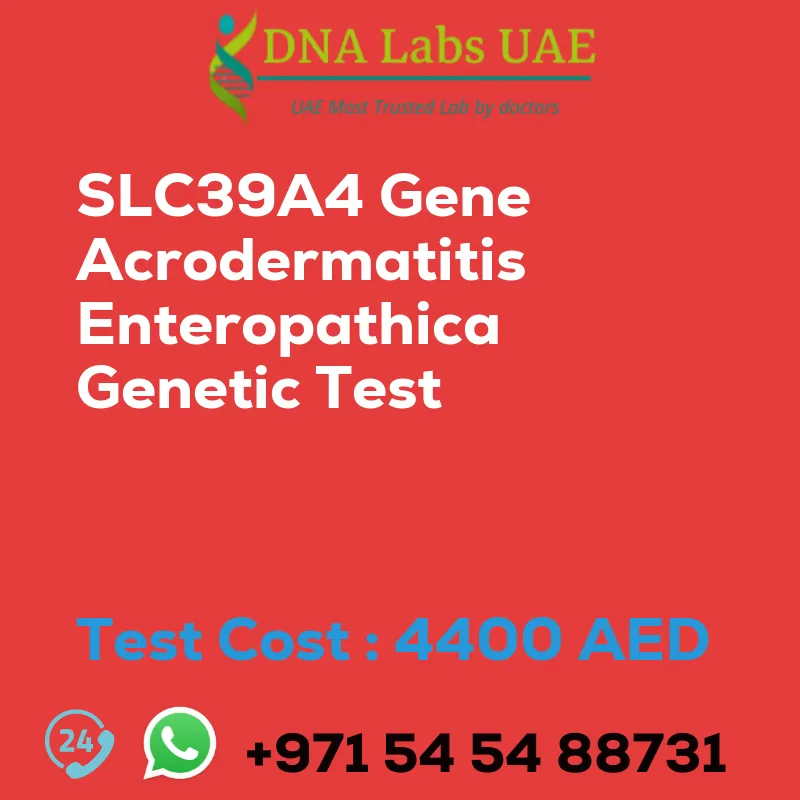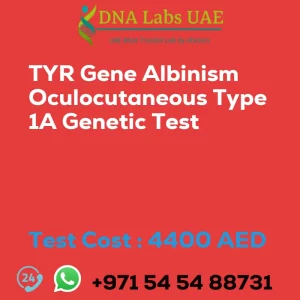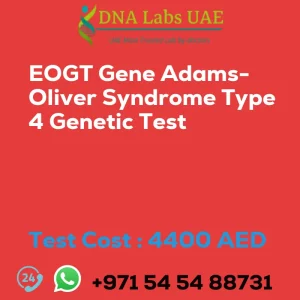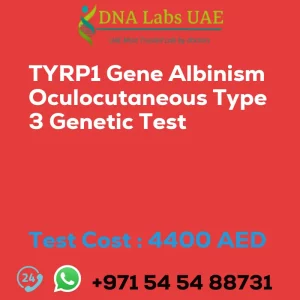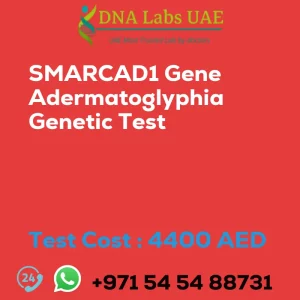SLC39A4 Gene Acrodermatitis enteropathica Genetic Test
Cost: AED 4400.0
Test Components:
- Price: AED 4400.0
- Sample Condition: Blood or Extracted DNA or One drop Blood on FTA Card
- Report Delivery: 3 to 4 Weeks
- Method: NGS Technology
- Test Type: Osteology Dermatology Immunology Disorders
- Doctor: Dermatologist
- Test Department: Genetics
Pre Test Information:
Clinical History of Patient who is going for SLC39A4 Gene Acrodermatitis enteropathica NGS Genetic DNA Test. A Genetic Counselling session to draw a pedigree chart of family members affected with SLC39A4 Gene Acrodermatitis enteropathica NGS Genetic DNA Test gene SLC39A4.
Test Details:
The SLC39A4 gene is responsible for producing a protein called zinc transporter ZIP4, which plays a crucial role in the absorption of zinc from the diet. Mutations in this gene can lead to a rare genetic disorder called acrodermatitis enteropathica.
Acrodermatitis enteropathica is characterized by a deficiency in zinc absorption, resulting in symptoms such as skin rashes, diarrhea, hair loss, and impaired growth and development. It is typically inherited in an autosomal recessive manner, meaning that an individual must inherit two copies of the mutated gene (one from each parent) to develop the condition.
NGS (Next-Generation Sequencing) genetic testing is a type of genetic testing that allows for the simultaneous analysis of multiple genes, including the SLC39A4 gene, in a single test. It involves sequencing the DNA to identify any mutations or variations in the genes being analyzed.
NGS genetic testing can be used to diagnose acrodermatitis enteropathica by identifying mutations in the SLC39A4 gene. If a person is suspected to have acrodermatitis enteropathica, NGS genetic testing can help confirm the diagnosis and provide information about the specific mutations in the SLC39A4 gene. This information can be useful for genetic counseling, as well as for guiding treatment and management strategies for the condition.
| Test Name | SLC39A4 Gene Acrodermatitis enteropathica Genetic Test |
|---|---|
| Components | |
| Price | 4400.0 AED |
| Sample Condition | Blood or Extracted DNA or One drop Blood on FTA Card |
| Report Delivery | 3 to 4 Weeks |
| Method | NGS Technology |
| Test type | Osteology Dermatology Immunology Disorders |
| Doctor | Dermatologist |
| Test Department: | Genetics |
| Pre Test Information | Clinical History of Patient who is going for SLC39A4 Gene Acrodermatitis enteropathica NGS Genetic DNA Test. A Genetic Counselling session to draw a pedigree chart of family members affected with SLC39A4 Gene Acrodermatitis enteropathica NGS Genetic DNA Test gene SLC39A4 |
| Test Details |
The SLC39A4 gene is responsible for producing a protein called zinc transporter ZIP4, which plays a crucial role in the absorption of zinc from the diet. Mutations in this gene can lead to a rare genetic disorder called acrodermatitis enteropathica. Acrodermatitis enteropathica is characterized by a deficiency in zinc absorption, resulting in symptoms such as skin rashes, diarrhea, hair loss, and impaired growth and development. It is typically inherited in an autosomal recessive manner, meaning that an individual must inherit two copies of the mutated gene (one from each parent) to develop the condition. NGS (Next-Generation Sequencing) genetic testing is a type of genetic testing that allows for the simultaneous analysis of multiple genes, including the SLC39A4 gene, in a single test. It involves sequencing the DNA to identify any mutations or variations in the genes being analyzed. NGS genetic testing can be used to diagnose acrodermatitis enteropathica by identifying mutations in the SLC39A4 gene. If a person is suspected to have acrodermatitis enteropathica, NGS genetic testing can help confirm the diagnosis and provide information about the specific mutations in the SLC39A4 gene. This information can be useful for genetic counseling, as well as for guiding treatment and management strategies for the condition. |

